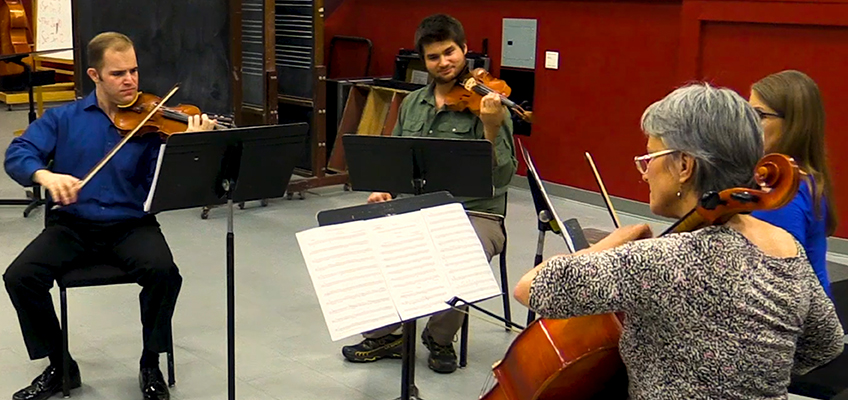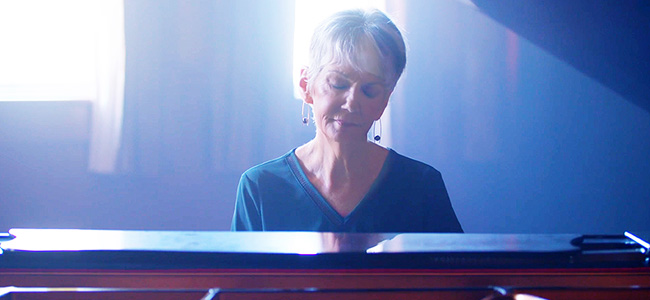
Documentary Explores the Power of Heart Intention in Musical Performance
The conductor abruptly waves, signaling the orchestra to stop playing. "People, please," she says, "when you play this piece, try to imagine, feel the emotion this great composer intended. Play each and every note from the heart. Again, from the beginning."
Words to that effect have been uttered by thousands of conductors and music instructors through the centuries. They are not words with which Dr. Kathleen Riley of California would disagree. The concepts they suggest are integral to her unique approach to helping musicians and clients in all professions achieve optimal performance and overcome related anxieties.
Riley is the co-writer and co-producer of the new documentary film, Intention: The Power of the Heart, in which she "shares her story and study of living with a higher level of consciousness in every area of life." The film details her work over the years with musicians and her research study, which she conducted with a string quartet.
"This study," Riley said, "examined the effects of intention and training in a technique known to increase physiological coherence in the members of a string quartet and audience participants.
"The study aimed to determine if a shared group emotional intention by the musicians would be conveyed through their music and perceived by the audience members, and if the performers shifted into a more coherent state prior to the performance, would this affect a change in the heart rate variability coherence in themselves and audience members."
Riley, who began playing piano at age 4 and has never stopped, co-wrote and co-produced Intention: The Power of the Heart. Her three degrees in classical piano, including a doctorate, experience as a professional musician, biofeedback certification, optimal performance coaching, HeartMath trainer certification, research and much more over decades helped lead her to conduct the study and ultimately produce the film.

Through the years of her own musicianship and education, Riley grew increasingly concerned about the physical and emotional rigors of musicianship. In the film, Intention: The Power of the Heart she says, "I began to be aware of how many injuries, performance injuries people were having, and debilitating performance anxiety. And I knew I wanted to make an impact."
While posture and technique are critical elements in music performance, she explained that focusing only on them were not bringing musicians to "that special place." Something was missing.
After some initial exposure, while visiting the University of Alabama in 2001, to the use of biofeedback to correct performance problems, Riley decided an approach of correcting compensations the body was making on musicians seemed in order.
"And that fired me up to come back and start … postdoctoral studies at NYU," she says in the trailer. "So, I decided to also begin investigating, through the HeartMath Institute, techniques that were effective in the moment and I met with Rollin McCraty and we actually designed this together."
Dr. McCraty, HeartMath Institute’s executive vice president and director of research, also appears in the trailer and the documentary film to discuss the organization’s research on, among other areas, emotions and the tools it has developed to help people self-regulate/manage their emotions.
McCraty explains that the magnetic field of the heart and energetic fields we generate individually and collectively, in this case both as musicians and audience members, influence and are influenced by musical performance.
"There is a real and measurable energetic communication," he said, "that goes on between people, whether they’re aware of it or not, or between an orchestra and … the audience members, and we’re all in this field. There’s also, I think, another element which is the emotionality that’s communicated through the music."
Riley said she chose to begin her research, which is discussed at length in Intention: The Power of the Heart, with members of the North State Symphony in California. With help, she gathered a quartet of string players – and so began the research study.
With that work complete now and the documentary about it being widely distributed, Riley shared this thought about what she learned: "For musicians, it’s shifting them to a different level of consciousness in every thought and intention they have, impacting their performances and messages being shared."
- Riley and McCraty currently are co-writing an article on the research for peer-reviewed publication.
-
Click the film’s title, Intention: The Power of the Heart, to watch the documentary, which is a little under 14 minutes. Learn more about Riley and her work at www.drkathleenriley.com/
about/ . - You can read and learn about HeartMath’s widely recognized research on emotions, heart coherence and heart rate variability by simply entering those terms in a search at our online Research Library.

